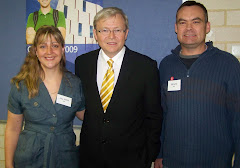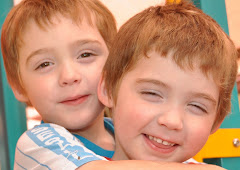 Bill Shorten, Parliamentary Secretary for Disabilities and Children's Services, was the Opening Address at the Acia Pacific Autism Confernce 09 (20-22 August). His Media Adviser has kindly provided me with a copy of the speech. I would like to share it with you, but have decided not to make my own comments because I don't want to influence your thoughts. I would love for you to tell me what you think, even if you live outside of Australia.
Bill Shorten, Parliamentary Secretary for Disabilities and Children's Services, was the Opening Address at the Acia Pacific Autism Confernce 09 (20-22 August). His Media Adviser has kindly provided me with a copy of the speech. I would like to share it with you, but have decided not to make my own comments because I don't want to influence your thoughts. I would love for you to tell me what you think, even if you live outside of Australia.
You will see in my post "Our Exciting Meeting with the PM, Kevin Rudd & Parliamentary Secretary for Disabilities, Bill Shorten" that Shane & I were fortunate enough to have an unexpected meeting with Bill Shorten following our 20 minute one-on-one meeting with the Prime Minister on 28th July 2009. My good friend Helen Howson and I have been waiting for a mutually conventient time to meet with Bill since then in relation to a few matters, including the review for the National Disability Parking Permit Reform and funding opportunities for our playgroup. It has been extremely difficult to coordinate a meeting due to the distance issue, but we are hopeful it will happen soon.
SPEECH BY BILL SHORTEN:Thursday, August 20th, 2009
Opening Address to the Asia Pacific Autism Conference in Sydney.
Good Morning, everyone.
I'm pleased to be here. I'm representing the Prime Minister who couldn't be here but he sends his best wishes to this conference. I too, like Aunty Sylvia, would like to acknowledge that we're meeting on the land of the Gadigal people of the Eora Nation and I would like to pay my respects to their elders, both past and indeed present.
I would also like to acknowledge, representing the New South Wales Government, Mick Veitch, MLC, who's got a background in disability and impairment, both political experience and in a professional sense, so he's a very worthy representative here today. Adrian Ford and the work of Aspect, I'd like to acknowledge too.
Today's conference is a first for Australia. I understand that because we have representatives here from not only Australia but from Asia and the Pacific.
I was trying to think of a collective noun for people who care about autism, and I was trying to work out, is it a conference of people? And I thought, no, conference is too tame. Is it a protest of people? Possibly, because you should be. But perhaps it's almost an armada; an armada of love, an armada of emotion, and an armada of hope that we can make the world better in terms of the lives of people with autism. Fifteen hundred delegates is a great number.
I do understand after 20 months of being the Rudd Government spokesperson in disability, the intensity, the passion, the commitment and the love of people which motivates the big heart of the autism community.
I get that autism is a health issue where there is not enough quality information and not enough quality support. I get that autism is an isolating issue where there are too many families who feel isolated and disconnected. I get, in particular, that talking to parents of children with autism and young adults and adults with autism, just how similar your experiences are.
It is the grief and the shock that comes with a diagnosis of autism. The denial, the search for answers. I know that most here could earn a PhD in Google, trying to find out the best solutions and support. I understand it is the despair of trying to understand and managing what can be truly challenging behaviours.
I am embarrassed at the struggle that families in Australia have to undertake to find doctors, therapists and teachers with experience or, indeed, even with empathy for what it means to be autistic or to care for someone with autism.
Your conference and your community is rightfully seeking, persisting, calling for and demanding answers. I'm smart enough not to claim that we have all the answers but I do believe we have done some good things nationally since coming to office. But, of course as Adrian said, it is a beginning, it's not the end.
I think there have been things done, long overdue, in the autism field. A hundred and ninety million dollars does assist families and children with ASDs. It is the first proper package aimed at early intervention and providing help for children before they start school.
We have funded autism advisers across the country to assist families in that crucial post diagnosis stage to help access the services available to them. Because a website can never replace the capacity to talk to individuals to help us through these things.
According to my Department there have been over 35 autism advisers - I think that means there's 36 - recruited to support 4776 children and their families. It is correct to say that 3302 children across Australia have been accessing this early intervention funding. And the number of organisations and service providers able to provide funding under this system keeps increasing. There are 318 multidisciplinary organisations on the panel with 501 services located, I acknowledge, somewhat imperfectly across our country.
We are establishing and moving ahead with our six autism-specific early learning and care centres. Through their affiliations with universities and hospitals - and some of the eminent speakers you'll be hearing over the next number of days are involved in these projects - we will see not only long day care but more significantly a research and workforce training component which can deal or start to deal with some of the long term challenges.
Service providers at four of the six centres have been officially announced. The Adelaide centre is in fact now open and southwest Sydney will open early next year. We do have a website run by the Raising Children Network to provide more information to try and reduce the sense of isolation that people feel.
Now, these resources are important and it is important I put them on the record, not just because of the support they offer, but because they are a sign of hope that there can be the potential to offer parents and professionals and carers the support they require.
But, at this conference, it would be wrong of me not to acknowledge the amount of guilt that society transfers onto the shoulders of the parent with a child or an adult with a disability.
This added burden is wrong and ridiculous in our country.
If we saw the sort of discrimination and isolation which the autism community experiences; administered on basis of skin colour or gender, the law would come down in a very heavy fashion. But with an impairment or a condition such as autism - and not just autism, I might add - the ignorance of many in the community means that an enormous tyranny of guilt is transferred to parents which is unjustified and inhumane.
This belief that because the parent cannot control the child the parent must be at fault, without understanding the circumstances and the condition the child has, is tremendously isolating.
I think it is another challenge for parents and families already struggling with the physical, emotional, and very much the financial burden, of raising a child with special needs.
I have learned in the last 20 months that we simply do not have enough specialists or generalists who understand autism, and this is so important. We need the specialists who can look at the big picture, connect the dots, create the medical, educational and community solutions to the problems that are actually occurring in an almost identical fashion in all of the postcodes of Australia.
I lose count of the number of times that parents have told me of their children being misdiagnosed or simply sedated. Parents are continually dealing with the well meaning professionals who don't fully understand the complexity of autism.
I do not blame anyone individually. Dealing with autism does require specialist training, a lot of experience, and the recognition that every child is different. We are putting forward trained specialists for autism but so much more needs to be done. We are training more teachers how to understand autism but, again, I recognise that this doesn't even touch the sides of the challenge.
I do believe that a conference such as today is an important source in that continual search for knowledge about autism. It would be remiss of me not to acknowledge there are major fundamental problems with the way that the support system works for ASDs in Australia.
I see the experience of a parent of a child with autism, and indeed the life of a person with autism, as a series of collisions where the system that should be supporting the parents in fact fails and betrays them time and time again.
You get the first collision at diagnosis when you search for the early intervention services which are still too rare, despite the best efforts of this Government. Then there is the collision to try and find a suitable primary school that will offer the right sort of support. To be honest, I believe that trying to find a good school is sometimes a lottery.
As this child gets older and moves from that oh-so-cute three and four year old to a much heavier child at 13 and 14, some of their challenging behaviour will require more support than they did when they were younger. Parents are still too often forced to be individual advocates for their child's right to a fair go from the school system. They are too often treated as trouble makers for simply seeking adequate support for their child. Emotionally squeezed for the simple act of loving their child. Then we arrive at another collision at secondary school followed by that next smash which is the post-world transition to work or to day care.
Now, I do know that things are getting better and it's a fine balancing act when you're a member of parliament to acknowledge what is being done, yet still be honest enough to acknowledge what is not being done. I do know things are getting better and in large part that's due to the energy of people in this room.
I do know, talking to families who lived in 1950s and '60s, where their autistic brother and sister was simply hidden, that at least, courtesy of a lot of the people in this room and a lot of the research and a lot of the love and energy, that autism is not hidden away as it once was.
But I do think that we have to know, in order to meet the needs of the ASD community, what the community is. There is not enough data out there.

.jpg)





